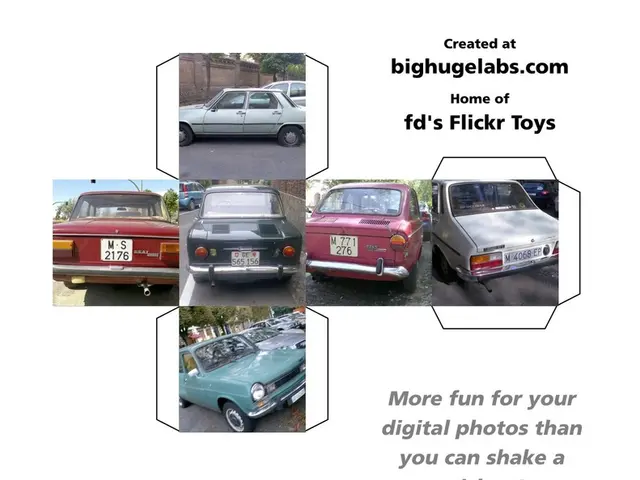Weekly EV industry update: Audi reflects industry's EV stagnation trend this week
Going Green, the Audi Way: This week, we're diving into how Audi is tackling the challenges of transitioning to a greener future without compromising on performance and customer preferences.
Audi is embracing electrification, but they're not ready to forego their best-selling gasoline model - the 2025 Audi Q5. After a comprehensive overhaul, the Q5 sports updated tech features and sleek styling, while maintaining its popular layout. By keeping parallel lines for electric and internal combustion cars, Audi aims to offer more choices to customers. However, the playing field isn't entirely level.
The 2025 Q5 may retain yesterday's powertrain, but it keeps up with technology. Featuring the same electrical architecture, operating system, and three-screen dashboard display as the latest Audi EVs, like the Q6 e-tron, the only difference from the driver's seat is a bit of engine noise.
It's not just the infotainment systems. The Q5 and Q6 e-tron are quite similar in size, offering similar space for passengers across their two rows of seats. The Q6 e-tron boasts a bit more cargo space, but not as much as expected due to the lack of a bulky engine, transmission, and driveshafts. The two SUVs share similar styling, but the Q5 is a more pleasant drive thanks to refined handling and a comfortable ride quality.
More Than Meets the Eye
Despite sharing interiors, the Q5 and Q6 e-tron differ in terms of materials and driving dynamics. The Q5's interior materials feel nicer to the touch, and its chassis provides crisper handling and a plusher ride quality compared to the Q6 e-tron. The base Q5 is quicker than a base Q6 e-tron in a straight line, although its dual-clutch transmission could use some smoother shifts.
The differences between the Q5 and its sportier SQ5 counterpart are more apparent than those between the Q6 e-tron and the SQ6 e-tron. While the latter doesn't justify its price premium over base models, the SQ5 offers a more engaging driving experience. Audi has shown it knows how to build a sporty EV, as demonstrated by the e-tron GT, and there are plenty of examples like the Ford Mustang Mach-E and Hyundai Ioniq 5 N that prove the same can be achieved with mid-range electric offerings.
Mixed Messages from the Top
As the U.S. government pursues a trade war with China that could impact the supply of rare earth minerals crucial for EV production, automakers are finding themselves in a holding pattern. Policies aimed at rebuilding domestic auto manufacturing don't necessarily benefit EVs. For instance, General Motors opted to produce gasoline SUVs and pickup trucks at its Orion Assembly plant in Michigan instead of EVs, a move criticized by environmental groups but defended by the company as a response to strong demand and tariffs.
This week also saw Trump revoke California's regulatory waiver that would have allowed the state to end sales of most new internal-combustion vehicles by 2035. California and 10 other states quickly filed a lawsuit in response, adding to the uncertainty facing automakers.
In these uncertain times, Audi's approach is typical - balancing EV sales, investments in EV production, and regulatory uncertainties while remaining responsive to customers' wants and needs. And as electrification continues to reshape the automotive landscape, Audi is gearing up to meet the challenges head-on.
- Audi's vision for a greener future doesn't exclude the finance industry, as they continue to invest significantly in electrification technologies.
- The transportation sector is undergoing a dramatic transformation, with automakers like Audi focusing on the development of electric vehicles (EVs) like the 2025 Audi Q5 and Q6 e-tron.
- Cybersecurity is a crucial concern in today's technology-driven world, and with the increase in EV adoption, cybersecurity measures will be essential to prevent potential threats to these vehicles' data and cloud computing systems.
- Lifestyle preferences are influencing the direction of the industry, as people are increasingly seeking sustainable living options, which aligns with Audi's approach to electrification.
- In the automotive industry, the demand for electric vehicles is growing, with models like the 2025 Audi Q5 and Q6 e-tron reflecting this trend.
- Home-and-garden businesses may benefit from Audi's focus on sustainable living, as the company's EVs can contribute to reducing carbon emissions associated with traditional gasoline vehicles.
- The business world is closely watching the development of the EV market, particularly in real-estate, as locations with available charging infrastructure become more attractive to potential homebuyers.
- The gadgets industry is also adapting to the rise of EVs, with manufacturers creating accessories to enhance the in-car experience, such as wireless charging pads and state-of-the-art infotainment systems.
- As Audi continues to invest in electric vehicles, data and cloud computing will play a vital role in optimizing battery performance, energy efficiency, and overall vehicle lifespan.
- The automotive industry is not only focused on building cars, but also on car maintenance, ensuring that electric vehicles are properly serviced to maintain their performance and longevity.
- Sports enthusiasts can also look forward to the potential of electric vehicles, as companies like Audi are developing electric sports cars like the e-tron GT and racing EVs for events like the grand prix.
- The weather forecasting industry may find opportunities in the growth of EVs, as improved data could lead to more accurate predictions for charging station utilization and efficient route planning during inclement weather conditions.








